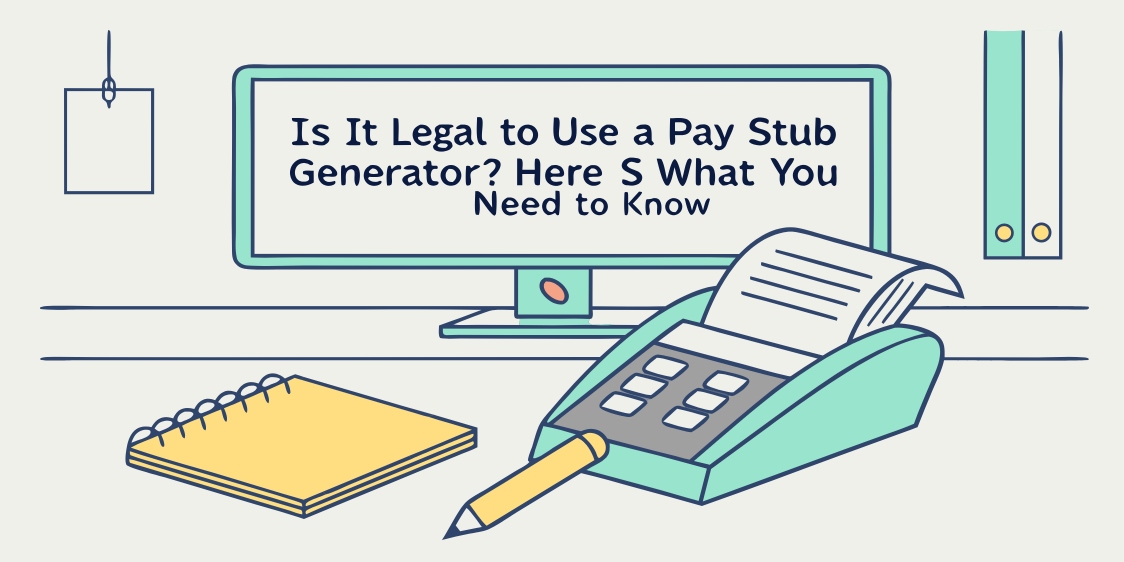
Is It Legal to Use a Pay Stub Generator? Here’s What You Need to Know
In today's fast-paced digital economy, many individuals and small business owners rely on pay stub generators to quickly create professional-looking documents for payroll, loans, rentals, or tax purposes. But while these tools offer speed and convenience, a common question arises: Is it legal to use a pay stub generator?
The short answer is yes, it is legal as long as it’s used honestly and responsibly. In this article, we’ll explore when it’s legal, when it crosses the line, and what you should keep in mind.
What Is a Pay Stub Generator?
A pay stub generator is an online or software-based tool that allows you to create detailed records of employee earnings. These documents typically include:
● Gross income
● Deductions (taxes, insurance, etc.)
● Net pay
● Pay period and pay date
● Employer and employee details
Pay stub generators are especially popular among freelancers, small business owners, gig workers, and even HR professionals who manage payroll manually or without expensive software.
When Using a Pay Stub Generator is Legal
Using a pay stub generator is perfectly legal if you meet these criteria:
You Provide Accurate Information
As long as the information you input is true and reflects real income, taxes, and employment details, the stub is a valid document.
You’re Creating It for Personal or Business Use
You can legally generate a pay stub for:
● Your own records
● Employees or contractors you pay
● Proof of income for self-employed work
● Tax documentation
You’re Compliant with Local Tax Laws
If your generated stubs account for applicable deductions (e.g., FICA, income tax, unemployment insurance), and you report that income to tax authorities, you're in the clear.
When It Becomes Illegal or Fraudulent
Pay stub generators become a legal problem when they’re used to deceive. Here are some red flags:
Falsifying Income or Employment
Creating a fake pay stub to inflate income for:
● Loan or mortgage applications
● Renting an apartment
● Gaining government benefits
● Evading taxes
This constitutes fraud and can lead to criminal charges or civil penalties.
Using a Non-Existent Business Name
If the employer listed on the stub doesn’t exist or is not legally registered, the pay stub may be considered fraudulent.
Submitting Fake Documents to Third Parties
Banks, landlords, or government agencies often verify submitted pay stubs. Providing a knowingly false document can lead to rejection, blacklisting, or legal consequences.
Legal and Ethical Tips for Using Pay Stub Generators
● Always use real, verifiable information
● Register your business or freelance activity if you issue pay stubs regularly
● Use the stubs only for legitimate purposes, like documentation or financial planning
● Choose a reputable pay stub generator that offers compliant templates and accurate tax calculations
● Keep backups and records to support the information shown on the stub
Penalties for Misuse
Using fake pay stubs intentionally for fraud can result in:
● Fines
● Rejection of applications
● Loss of government benefits
● Legal prosecution for identity theft, forgery, or fraud
● Damage to your credit history or employment record
Conclusion
Yes, pay stub generators are legal tools but only when used ethically and truthfully. They are ideal for self-employed workers, contractors, small business owners, and HR managers looking to streamline payroll processes. The moment you use them to fabricate or misrepresent information, it becomes a serious legal offense.
So if you’re using a pay stub generator for genuine income documentation or employee payments, you’re on solid ground. Just remember: honesty isn’t just the best policy it’s the legal one too.